- A selection of documentaries about the Nakba and its aftermath.
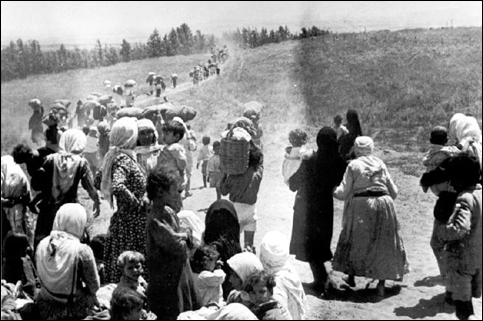
- Remembering the Nakba (1948)
Two film screenings: May 11-12 2010
Cinéma du Parc – cinemaduparc.com
3575 av. du Parc

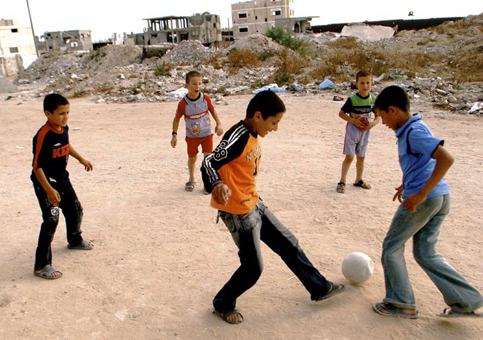
Photo: Palestinian youth play football in along apartheid wall in occupied Palestine.
Two Israeli soldiers were charged in a military court yesterday with forcing a 10-year-old Palestinian boy in the Gaza Strip to handle objects they suspected of being rigged to explode.
The soldiers were indicted for “ordering the boy to open cases that they thought were explosives”, Major Dorit Toval, the prosecutor, said. The alleged crime took place during Operation Cast Lead, the Israeli military onslaught waged more than a year ago with the aim of halting Hamas rocket fire at southern Israel. A gag order was placed barring publication of the names of the soldiers.
May 2010 Open letter to Margaret Atwood from Tadamon! collective and Art Threat
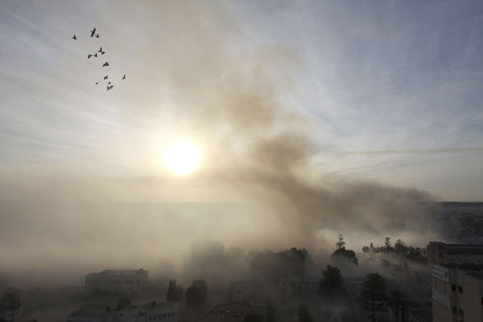
Today, as systematic human rights violations continue to be committed by the Israeli government against the Palestinian people, we are appealing to you on behalf of the Montreal-based collective Tadamon! and Art Threat concerning your planned visit to Tel Aviv.
We have learned that you have been offered the Dan David Prize from the Tel Aviv University for your outstanding literary work. First, we want to openly recognize your work, renowned not only for literary excellence but also for the humanistic message it portrays. Beyond literature your sincere advocacy for social justice, from the struggle for women’s liberation to environmental protection, has made you an international role model who people respect and admire.
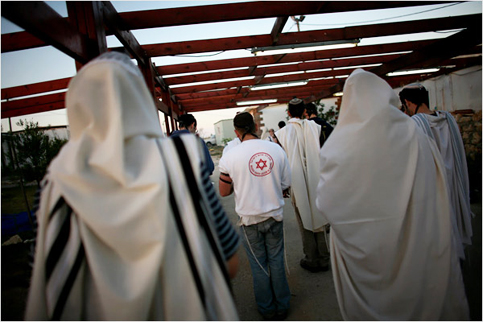
Photo: Uriel Sinai Israeli settlers at a West Bank outpost near Nablus, Palestine.
Prime Minister Benjamin Netanyahu unjustifiably draws fire for policies that move ahead without his involvement. The Jewish intellectuals, who suddenly saw the darkness and were terrified, should know: Even if not one more Jewish home is built in the occupied territories (including East Jerusalem), the enormous apparatus of domination continues to operate there with an inner logic of many years’ duration. It moves along by itself, like some huge aircraft without a pilot.
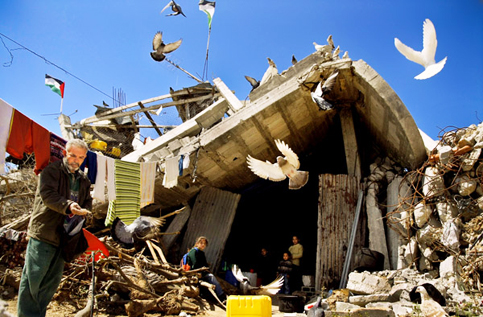
I’m not Israeli. I’m not Palestinian. Nor Jewish, nor Arab, nor Muslim. I’ve never been to Jerusalem, nor Ramallah. I’m not sure if I’ll ever go there. I have no relatives who live there, no family who ever went there, or came from there. I have a friend who lives there, but I only knew him when we were children in Calcutta more than forty years ago. I don’t remember what he looks like.
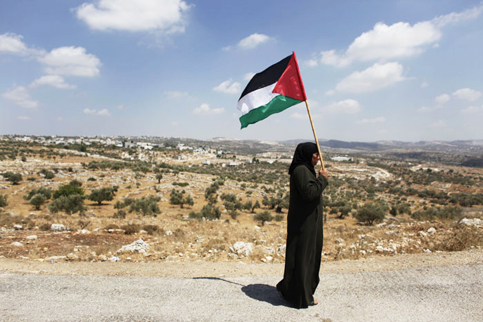
January’s revelations about the U.S. Army Corps of Engineers assisting with the design and installation of yet another border wall around Palestine, this one placed under the ground, is just the latest development in a series of relationships between: North American neoliberalism, U.S. domestic and foreign drug policy, structural anti-latino racism in the U.S., the Egyptian government, Mexico’s ruling elite and Israel’s military occupation of Palestine. To find connections between various international interests is not surprising but the links between, for example, Mexican classism and President Mubarak’s aversion to democracy are perhaps less known. How the occupation forces action from one and provides tools for the other is a connection worth exploring as is the potential for joint struggle between individuals and communities focusing on seemingly disparate issues amidst broader struggles for justice.
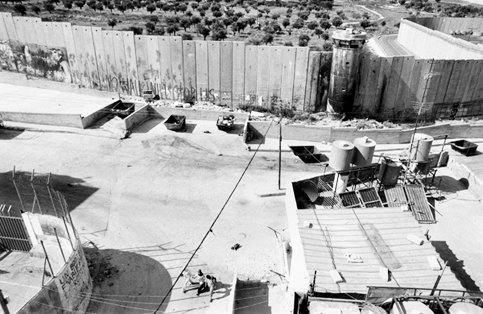
Yves Engler’s new book raises important issues at the centre of debates in this country and about which we all need to become better informed.
The title refers to the conditions Israel imposes on Palestinians, which some say amount to the crime of apartheid, as defined by the International Convention on the Suppression and Punishment of the Crime of Apartheid.
Obviously, not everyone agrees with this interpretation, and the point is one that can give rise to a healthy debate.
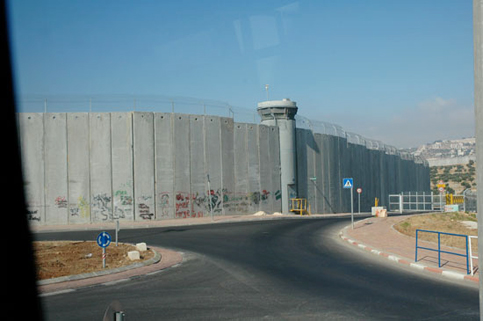
Yves Engler’s new book, Canada and Israel: Building Apartheid, is a stunning examination of the history of Canada-Israel relations and a key read for anyone interested in Canadian foreign policy of all political stripes.
Engler’s commitment to critiquing injustices linked to Canadian government and corporate policy is applied here to Canada-Israel relations and works within a broader critique of Canada’s national narrative as a force for peace in the world. He unravels the image of Canada as a broker of peace in the Middle East through well-researched details and outlines a historical thread that links successive Canadian governments to the suppression of Palestinian human rights and self-determination.
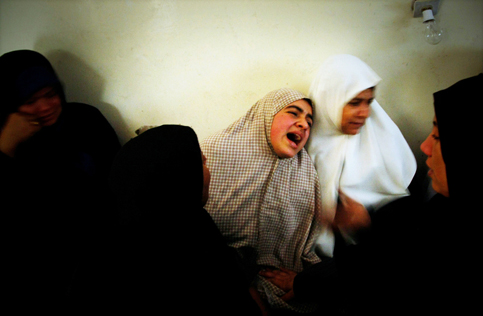
I am writing to you on the eve of Canada Post issuing a joint stamp with Israel.
A recent article in Canada Stamp Detail said “Canada Post will issue the stamp “to celebrate Canada’s strong bilateral relationship with Israel – a friendship that spans six decades and is marked by shared values, common interests and strong political, economic, cultural and social ties.”
While CUPW is glad to see Canada Post taking on new and innovative ways to sell stamps, we are somewhat concerned that Canada Post is launching a stamp with Israel on the basis of “shared values”.
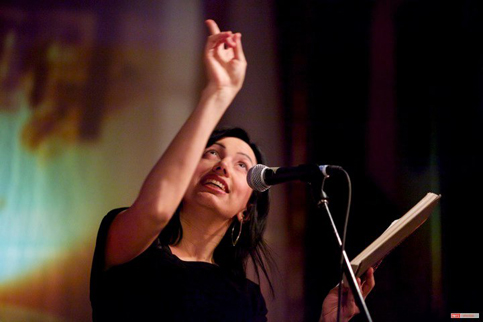
Photo: Heri Rakotomalala. Performance by Palestinian poet Rafeef Ziadah.
Celebrated artists from Toronto and Montreal took the stage at the twelfth edition of Artists Against Apartheid at La Sala Rossa, performing socially conscious poetry and music for a packed room. Throughout the past years Artists Against Apartheid has grown in Montreal into a dynamic concert series, regularly attracting hundreds of people and featuring a diverse array of celebrated artists.
Artists Against Apartheid XII was the Montreal launch for Palestinian poet Rafeef Ziadah’s debut release Hadeel, a powerful album rooted in poetic reflections on the Palestinian struggle for liberation.